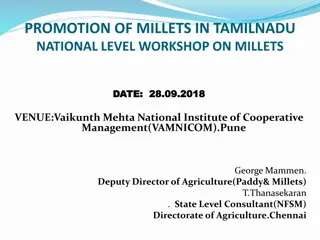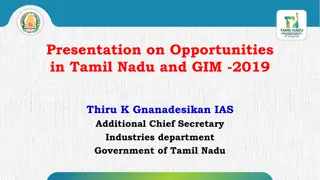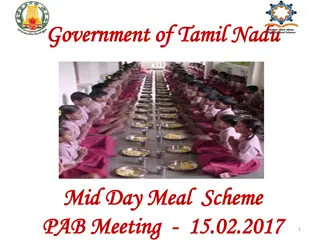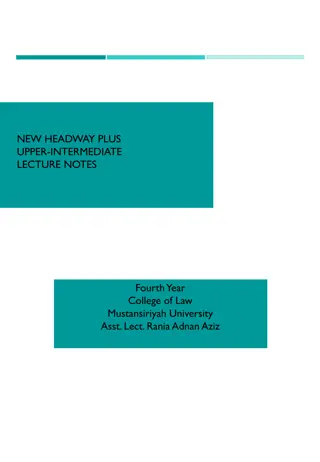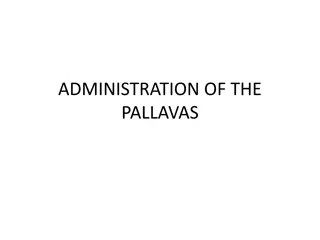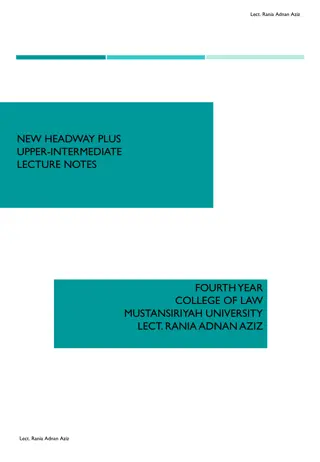Tamil Nadu Devadasi System: Past, Present, and Legislation
The Devadasi system in Tamil Nadu historically involved dedicating young girls to temples but has now evolved into a form of exploitation and sex work. Despite the Tamil Nadu Devadasi (Prevention of Dedication) Act of 1947, challenges persist due to societal issues like discrimination and poverty. While reports of the system's practice remain disputed, legal measures and rehabilitation efforts in the state are lacking.
Download Presentation

Please find below an Image/Link to download the presentation.
The content on the website is provided AS IS for your information and personal use only. It may not be sold, licensed, or shared on other websites without obtaining consent from the author. Download presentation by click this link. If you encounter any issues during the download, it is possible that the publisher has removed the file from their server.
E N D
Presentation Transcript
Tamil Nadu Devadasi (Prevention of Dedication) Act, 1947
What is the Devadasi system? Young girls who are yet to attain puberty are offered to temples through marriage to the local deity conducted by the local priest. Presently, the Devadasi system is a way to push young girls into sex work and Devadasis are expected to have sexual relationships with men who could support them and their families. Dedicated women are traditionally from SC/ST communities and socio-economically backward classes Religion, caste discrimination, patriarchy and poverty are the main reasons for the persistence of the Devadasi system.
Devadasi System in Tamil Nadu Data on the prevalence of the Devadasi system is missing for the State of Tamil Nadu No comprehensive state-wide or even district-wide surveys in vulnerable parts of Tamil Nadu have been conducted Predominant view is that Devadasi System is not practiced in Tamil Nadu 2017 Media Reports of temple ritual in Tiruvallur district involving dressing up girls as young brides and offering them to Goddess Mathamma, the presiding deity National Human Rights Commission took cognizance of the complaint and noted that the girls are disrobed and deemed to be public property
Tamil Nadu Devadasi (Prevention of Dedication) Act, 1947 Tamil Nadu was one of the first States to have a law prohibiting the dedication of girls. a. Dedication of a woman as a Devadasi declared unlawful and void b. Dedicated woman shall not be considered incapable of entering into a valid marriage notwithstanding any custom or usage c. Dancing by a woman within the temple precincts or in any procession of a Hindu deity declared unlawful
Offences and penalties under the Act a. Any person above 16 years who performs or takes part in a dedication ceremony shall be punishable with imprisonment of 6 months or fine b. Woman who is being dedicated may also be punished for taking part in the ceremony c. Any person above 16 years who dances in temple precincts shall be punishable with imprisonment for 6 months or fine
In Tamil Nadu, as on date: a. No Rules have been framed for the implementation of the Act b. No schemes for rehabilitation of Devadasi women through educational opportunities, loans, homes ownership, counselling exists in Tamil Nadu
The Devadasi prevention laws are weakly enforced and there are almost no cases from the Madras High Court on dedication ceremonies In 2015, the Central Government issued an advisory to all State Governments for implementation of the Devadasi Prohibition legislations: a. Directed all States and UTs to ensure strict implementation and deal with all cases strictly without exception b. Directed States and UTs to initiate special drives to identify all victims and rehabilitate them counselling, medical treatment, sensitization and skill development c. Support of NGOs to be taken for rehabilitation programmes
VISHAL JEET v. UNION OF INDIA The Petitioner challenged the inefficiency of the police and sought for directions for implementation of the Devadasi legislations. Supreme Court passed following directions: a. States and UTs should direct police to take speedy action b. States and UTs should set up Advisory Committees to make suggestions on measures to eradicate child prostitution and rehabilitation c. States and UTs should provide rehabilitative homes with trained psychiatrists and social workers d. Central Government to set up a committee to develop welfare programmes
GAURAV JAIN V. UNION OF INDIA This PIL pertained to the rights of the children of Devadasi women and minor girls. The Court, while investigating the matter, directed that: a. Rehabilitation programmes should be implemented to bring Devadasi women out of prostitution b. Rescue and rehabilitate child sex workers and frame schemes for their care c. A Committee should be set up and study the challenges in the implementation of the law and the rehabilitation schemes developed
S.L. FOUNDATION V. UNION OF INDIA The Supreme Court in this case held that the dedication of Dalit girls was unconstitutional and in violation of Articles 23(1), 39(e) &(f), 14, 21 of the Constitution of India. The Supreme Court passed the following directions: a. To bring the women out of the cycle of prostitution b. To frame suitable schemes for their rehabilitation c. To take action against police officers under whose jurisdiction Devadasi traditions flourish
Other applicable statutes 1. Scheduled Castes and Scheduled Tribes (Prevention of Atrocities) Act, 1989 - Whoever, not being a member of a Scheduled Caste or a Scheduled Tribe performs, or promotes dedicating an SC or ST woman to a deity, idol, object of worship, temple, or other religious institution as a Devadasi shall be punishable with imprisonment of six months to five years and with fine. Scheduled Castes and Scheduled Tribes (Prevention of Atrocities) Act, 1989 is applicable only if the offence is committed by individuals who are not members of Scheduled Castes and Scheduled Tribes The 1947 Act prohibiting the Devadasi practice is applicable to all, especially as the ceremonies are often initiated and performed by family members.
2. POCSO Act Applicable where the dedicated girl is a minor at the time of dedication and has been subjected to sexual assault 3. Protection of Women from Domestic Violence Act Can seek relief and protection orders 4. ITPA Penalises keeping of brothels, engaging in prostitution and provides for heavy punishment of 7 years imprisonment
Way forward a. Develop and conduct awareness programmes in Tamil Nadu, especially in border areas, on the Devadasi system and how it violates the rights of young girls b. Advocate for law reform to amend the law whereby dedicated Devadasi women are no longer prosecuted c. Engage with government officials for establishment of Advisory Committees and develop welfare schemes to rehabilitate women and girls pushed into prostitution d. Where the dedication has been carried out by a non-SC/ST person of an SC/ST woman, claim relief amounts provided under the PoA Act e. Encourage women who have been dedicated to use the PWDVA to seek other remedies




